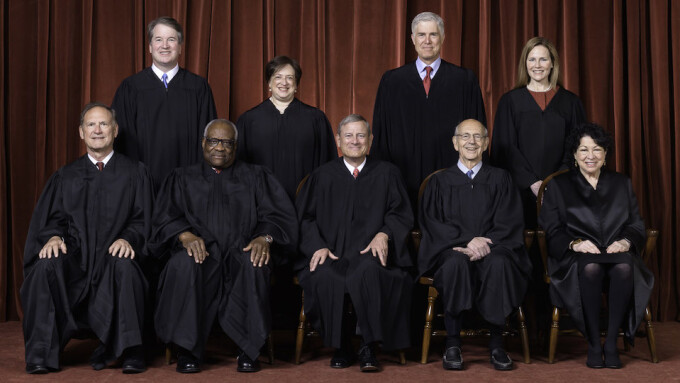WASHINGTON — The Supreme Court declined today to settle a question presented by a Jane Doe looking to establish Facebook’s liability in a case where she alleges that she was “sex trafficked as a minor” because the social media platform “connected her with a sex trafficker.”
The case had already gone all the way up to the Texas Supreme Court, although that tribunal’s decision pointed out the issues with trying to determine Section 230 protections, particularly in a case that also invoked FOSTA-SESTA.
Today, the Supreme Court denied the request to take up the questions about Section 230 filed by the Jane Doe’s attorneys in September 2021, although conservative Justice Clarence Thomas added a statement opining that “although the case was not appropriate for court review, Congress should revisit the scope of Section 230,” legal news site Law360 reported.
The Question Posed to the Supreme Court
According to her attorneys’ filing, the Jane Doe plaintiff in the original Texas case “was sex trafficked as a minor because Facebook’s products connected her with a sex trafficker. The trafficker sold her for sex, allowing men to serially rape her in exchange for money. She was rescued by law enforcement and now seeks to hold Facebook accountable through this action alleging common-law and statutory claims under Texas law.”
After Facebook asserted Section 230 immunity as part of its defense, the Jane Doe attorneys wrote, “the Texas Supreme Court concluded that this provision granted Facebook sweeping immunity on all but one of [her] claims. The court felt constrained by existing precedent to reach that holding, but also emphasized that it expected this Court to conclusively address Section 230’s reach.”
The question the Jane Doe attorneys presented to the Supreme Court and that the tribunal declined to take up was, “Does Section 230 of the Communications Decency Act provide immunity from suit to internet platforms in any case arising from the publication of third-party content, regardless of the platform’s own misconduct?”
Justice Clarence Thomas Lobbying for Section 230 Reform
Using the denial’s accompanying statement to actively lobby a separate branch of government for Section 230 reform, Thomas appeared to accept all of the Jane Doe’s sweeping liability claims against Facebook.
The Texas Supreme Court, Thomas wrote, “afforded publisher immunity even though Facebook allegedly 'knows its system facilitates human traffickers in identifying and cultivating victims,' but has nonetheless 'failed to take any reasonable steps to mitigate the use of Facebook by human traffickers' because doing so would cost the company users and the advertising revenue those users generate.”
Thomas also explicitly commended the controversial Texas Supreme Court decision, and its majority opinion quoting the text of FOSTA/SESTA, which states that Section 230 “was never intended to provide legal protection to websites that facilitate trafficking in advertising the sale of unlawful sex acts with sex trafficking victims.”
The Texas Supreme Court, Thomas wrote, recognized that the United States Supreme Court, “or better yet, Congress, may soon resolve the burgeoning debate about whether the federal courts have thus far correctly interpreted Section 230.”
Thomas went a step further in his personal crusade to intervene in internet regulation; unless Congress “steps in” to “clarify §230's scope, we should do so in an appropriate case. Unfortunately, this is not such a case,” he wrote. “We have jurisdiction to review only '[f]inal judgments or decrees' of state courts.”
Top-Level Judicial Activism Against Section 230
Back in October 2020, Thomas used a concurrent opinion in a previous case, which the court also decided not to hear, to issue a broader challenge on current liability protections for online platforms provided by Section 230, the so-called “First Amendment of the internet.”
In that instance, Thomas agreed with the majority’s view that the court would not hear a case concerning malware-blocking software companies Malwarebytes Inc. and Enigma Software Group USA LLC, but he also used the occasion to “open the door for the court to hear a broader challenge to Section 230 and decide ‘whether the text of this increasingly important statute aligns with the current state of immunity enjoyed by internet platforms,’” as legal news site Courthouse News reported at the time.
“Courts have long emphasized nontextual arguments when interpreting §230, leaving questionable precedent in their wake. Extending §230 immunity beyond the natural reading of the text can have serious consequences,” Thomas also wrote, and specified his concern about giving companies immunity from civil claims for “knowingly host[ing] illegal child pornography” and “for race discrimination.”
“We should be certain that is what the law demands,” Thomas added, in a clear invitation to advocacy groups and religiously and politically motivated actors to bring forth cases to challenge Section 230 before the highest tribunal.




